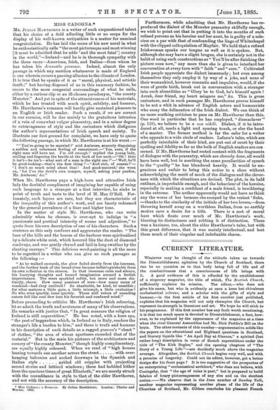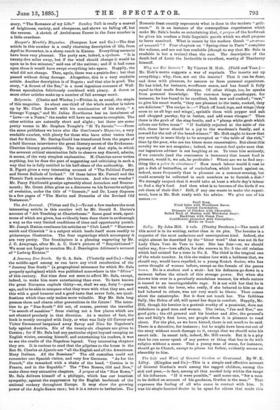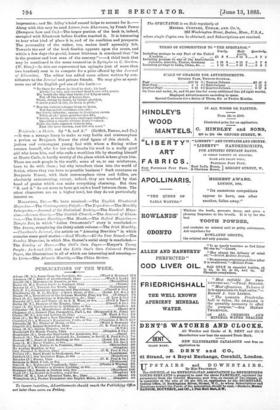CURRENT LITERATURE.
Whatever may be thought of the attitude taken up towardsthe Disestablishment agitation by the Church of Scotland, there can be no question as to that body being full of life and of the combativeness that a consciousness of life brings with it. A good evidence of this is afforded by the establishment of a sixpenny magazine, the title of which, The Scottish Church, sufficiently explains its mission. The editor,—who does not give his name, but who is evidently at once a keen but chivalrous ecclesiastical sabreur, and a scholar with the gifts of style and humour,—in the first article of his first number just published, explains that his magazine will not only champion the Church, but represent its strength in literature and art. We hope he will stick to his programme. If this first number has any fault worth mentioning, it is that too much space is devoted to Disestablishment, a fact, however, to be explained by the appearance of the magazine at a time when the rival General Assemblies had Mr. Dick Peddie's Bill on the brain. The other contents of this number—argumentative solids like the papers on the educational and Highland questions in Scotland, and literary liquids like "An April Day at Glencoe," a spirited (but rather long) description in verse of Scotch superstitions under the title of "The Kirk Bogies," and the opening chapters of "The. Story of a Young Life "—are decidedly much above the magazine average. Altogether, the Scottish Church begins very well, and with a promise of longevity. Could not its editor, however, get a better design for his front page ? It is too suggestive of the prospectus of an enterprising "ecclesiastical architect," who does not believe, with Coningeby, that " the age of ruins is past," but is prepared to build fabrics of hoary picturesqueness of any size and on the shortest notice.—We observe that in the June number of Sunday Taikt another magazine representing another phase of the life of the Churches of Scotland, Mr. Gibbon concludes his pleasant French
story, "The Romance of my Life." Sunday Talk is really a marvel of brightness, variety, and cheapness, and shows no falling off, but the reverse. A sketch of Archdeacon Farrar in the Jane number is a little overdone.
Harper's Monthly Magazine. (Sampson Low and Co.)—The first article in this number is a really charming description of life, from April to November, in a sheep-ranch in Kansas. Everything seems to have been very pleasant. The party saw, indeed, a cyclone. " It is twenty-five miles away, but if the wind should change it would be upon us in five minutes," said one of the natives ; and if it had come upon them it would have swept everything into space. Happily, the wind did not change. Then, again, there was a prairie-fire ; but that passed without doing damage. Altogether, this is a very readable article. Another description is of Bogota; and that also is good. The story, "A Secret of the Sea," is a most ingenious romance of WallStreet speculation felicitously combined with piracy. A dozen or more other articles make np a number of fall average merit.
Belgravia. (Ghetto and Winders.)—Fiction is, as usual, the staple of this magazine. As about one-third of the whole number is taken
up by Mr. Clark Russell with his continuation of his story, " A.
Strange Voyage," and Mr. Julian Hawthorne has an instalment of "Love—or a Name," the reader will have no reason to complain. The other articles are naturally short and alight ; but there are some pretty verses in Mr. Stephen Temple's " Si Ta Savais."—From the same publishers we have also the Gentleman's Magazine, a very readable number, with plenty for those who have other tastes than that for fiction. Mr. Baring-Gould has transferred from the pages of a bold German interviewer the great literary secret of the Erckrnann Chatrian literary partnership. The mystery of that style, in which the severest critical examination fails to observe any discord, admits, it seems, of the very simplest explanation. M. Chatrian never writes anything, but he does the part of suggesting and criticising in snob a way that he is fully entitled to his half-share of the authorship. Mr. R. Pigott gives a very interesting account of "The Political Poetry and Street Ballads of Ireland.". Of these latter Mr. Parnell and the Phoenix Park murderers share the honours. And who can wonder P Mr. Percy FitzGerald gossips agreeably about Arcachon and Bourne.
mouth; Mr. Grant Allen gives us a discourse on his favourite subject of evolution, under the title of " Genesis ;" and Dr. Leary disposes in a few pages of "The Merits and Demerits of the Revised Old Testament."
The Art Journal. (Virtue and Co.) —To not a few readers the most interesting article in this number will be Mr. Gerald S. Davies's account of "Art Teaching at Charterhouse." Some good work, speci mens of which are given, has evidently been done there in as thorough a way as the very limited conditions of time and opportunity permit.
Mr. Joseph Hatton continues his articles on " Club Land." " Hammersmith and Chiswick " is a subject which lends itself more readily to picturesque illustration. The four engravings which accompany it are very pretty. The frontispiece is a pleasing engraving by Mr. J. C. Armytage, after Mr. A. C. Gow's picture of " Requisitioned." We must not forget to mention Mr. J. Beavington Atkinson's account of "Ludwig Richter."
A Tourney Due South. By G. A. Sala. (Vizetelly and Co.)—Only the middle-aged among us can have any vivid recollection of the "Journey Due North" (a geographical misnomer for which Mr. Sala properly apologises) which was published somewhere in the "fifties" of this century. But time does not seem to affect Mr. Sala, except, indeed, to make him more entertaining than ever. To have known the great European capitals thirty—or, shall we say, forty ?—years ago, and to be able to compare what they were with what they are, and this with a good humour and a good taste that never fails, are qualifications which time only makes more valuable. May Mr. Sala long possess them and charm other generations in the future ! The intention to go "Due South" did not, of course, prevent the traveller "in search of sunshine" from visiting not a few places which are not situated precisely in that direction. As a matter of fact, the book is mostly occupied with Italy, or what was Italy till Cavour and Victor Emmanuel bargained away Savoy and Nice for Napoleon's help against Austria. Six of the twenty-six chapters are given to Corsica; for if Mr. Sala had any particular object beyond escaping an English winter, amusing himself, and entertaining his readers, it was to see the cradle of the Napoleon legend. Very interesting chapters they are. It is curious to read that the pilgrims to the house in the Rue St. Charles at Aje.ccio are "all the English and all the Americans. Many Italians. All the Russians." The old custodian could not remember one Spanish visitor, and very few Germans. "As for the French," she remarked with a shake of the head, 6Corsica is in France, and in the Republic." The "Two Homes, Old and New," make three very attractive chapters. A propos of the "New Rome," Mr. Sala delivers himself of a philippic, which has our heartiest sympathy, against the suppression by the English beefsteak of the national cookery throughout Europe. It may show the growing power of the Anglo-Saxon race ; but itis a return to barbarism. The Homeric feast exactly represents what is done in the modern " grillroom." It is an instance of the cosmopolitan experiences which make Mr. Sala's books so entertaining that, a propos of the beefsteak he gives his readers a little linguistic puzzle which we shall propose to leave unsolved. What is meant by the modern Greek "Firicirreettc Ihi 7ECOMAR " ? Four chapters on "Spring-time in Paris" complete the volume, and are not less readable (though to say that Mr. Sala is readable is but a truism) than the rest. The description of the death-bed of Louis the Invincible is excellent, worthy of Thackeray himself.
Why not Eat Insects ? By Vincent M. Holt. (Field and Tuer.)— Mr. Holt's motto suggests a war of reprisals. The insects eat up everything ; why, then, not eat the insects ? That it can be done, and done with pleasure, he assures us from personal experience. He has tried, for instance, woodlouse sauce, and has found it fully equal to that made from shrimps. Of other things, too, he speaks from personal knowledge. The common large grasshopper, for instance, he has found to be excellent, both raw and cooked ; "raw," to give his exact words, "they are pleasant to the taste, cooked, they are delicious." The recipe is :—" Pluck off head, legs, and wings [they seem to us all legs and wings], sprinkle them with pepper and salt and chopped parsley, fry in butter, and add some vinegar." Then there is the grub of the stag-beetle, and a " plump white grub which infests our fallen trees." " If foolishly rejected at the table of the rich, these larvae should be a joy to the woodman's family, and a reward for the toil of the bread-winner." Mr. Holt ought to know that any novelty is more likely to be accepted at "the table of the rioh," than by the poor, who are ten times more conservative. But about this novelty we are not sanguine ; indeed, we cannot feel quite sure that our ingenious adviser is not laughing at us. To treat him seriously, if we concede (and the concession is immense) that insect food is pleasant, would it, we ask, be profitable ? Where aro we to find anything like a pi!ce de resistance ? How much labour would it cost to get a dish of butterflies, or of cockchafers, which knock against us, indeed, more frequently than is pleasant on a summer evening, but could scarcely be collected in such numbers as to furnish a dish ? We strongly suspect that it would take at least a whole day's labour to find a day's food. And then what is to become of the birds if we rob them of their diet ? Still, if any one wants to make the experiment, here is Mr. Holt ready with his advice. We give one of his menus :—
Snail Soup. Fried Soles with Woodlouse Sauce. Curried Cockchafers. Fricassee of Chicken with Chrysalids. Boiled Neck of Mutton with Wireworm Sauce. Ducklings with Green Peas. Cauliflowers garnished with Caterpillars. Moths on Toast.
Sally. By John Hill. 3 vols. (Tinsley Brothers.)—The merit of this novel is in its writing, rather than in its plot. The heroine is a coquette of the mast audacious and unscrupulous kind. Indeed, she might almost be described by the " bitter word" that was not fit for Lady Clara Vero de Yore to hear. She has four—or, we should rather say, five—love affairs, for she renews in No. 6 the old relation which had existed for a time in No. 2. The third is the tragical one of the whole number. In this she makes love with a boldness that, we should say, would have repelled, to a young Scotch doctor, who has never thought of woman before, except as the female of the genus homo. He is a student and a stoics : but his defences go down in a moment before the attack of this strange power. But when she throws him over in a peculiarly scandalous manner, his whole nature is roused to an inextinguishable rage. It is not with her that he is wroth, but with the lover, who really, if she behaved to him as she had behaved to others, was not very much to blame. Then cornea about the catastrophe. But it does not touch her. The faithless Sally, like Helen of old, will spend her days in comfort. Happily, Mr. Hill, though his heroine is a portrait worthy of a pessimist, does not disbelieve in good men and women. The twins, "Jue and Rue," are good girls ; the old general and his brother and Alec, the general's son and Sally's first lover, are people whom it is pleasant to read about. For the plot, as we have hinted, there is not much to be said. There is a detective, for instance ; but he might have been cut out of the story without much damage to it, except that we should miss his smart talk. In smart talk, indeed, Mr. Hill excels. But it is a pity that he can never speak of any person or thing that has to do with religion without a sneer. That a young man of sense, for instance, should go to Church, except to please his father, evidently seems an absurdity to him.
The Life and Work of General Gordon at Gravesend. By W. E. Lilley. (Kingdon and Co.)—This is a simple and effective account of General Gordon's work among the ragged children, among the sick and poor,—in fact, among all that needed help within the range of his influence. "If it were possible," said some one, "for a man to be deified on account of his goodness, Gordon is the man." That expresses the feeling of all who came in contact with him. It was his single-hearted desire to be spent for others that made this
impression ; and Mr. Lilley's brief record helps to account for it.— Along with this may be read Letters from Khartoum, by Frank Power (Sampson Low and Co.)—The larger portion of the book is, indeed, occupied with Khartoum before Gordon reached it It is interesting to hear what kind of place it is, and of its condition and prospects. The personality of the writer, too, makes itself agreeably felt. Towards the end of the book Gordon appears upon the scene, and within a few days the genial, honest Irishman is convinced that "he is the greatest and best man of the century."—A third book that may be mentioned in the same connection is Epitaphs on C. Gordon. (W. Bice.)—In this are represented ten epitaphs (out of more than two hundred) sent in to compete for a prize offered by the Journal of Education. The editor has added some others written by contributors to the Journal and private friends. We may give as specimens one of the English and one of the Latin : " By those for whom lie lived he died ; his land
Awoke too late, and crowned dead brows with praise. He, 'neath the blue that burns o'er Libyan sand, Put off the burden of heroic days. There, strong by death, by failure glorified, 0 never proud in life, lie down in pride."
" Non inn victrici velamus tempera laura, Non tna natali condimus ossa Polo: tape tracts infraotus, ammo in discrimine reram Fides, et ala nimia proditus ipse fide, Vinceris, ut vincis moriens, snrgisque cadendo ; Quaeritur a enuetis ultimns hostis?—abest. Nails din vioto euperest victoria leto, Nam tibi more lncrum, nam tibi vita mon."
Benjamin : a Sketch. By "R. and A." (Griffith, Farran, and Co.) —It was a strange fancy to make so very feeble and commonplace a person as Benjamin Fraser the chief figure of this sketch. A jealous and extravagant young fool with whom a flirting widow amuses herself, who for her sake breaks his word to a really good girl who loves him, and who ends a worthless life by shooting himself at Monte Carlo, is hardly worthy of the place which is here given him. There are such people in the world ; some of us, to our misfortune, have to do with them ; but why introduce them into the world of fiction, where they can have no possible business ? Such creatures as Benjamin Fraser, with their commonplace vices and follies, are absolutely uninteresting, except, indeed, they are touched by that hand of genius which can make everything charming. But then " R. and A." do not seem to have got such a hand between them. The other characters are on a higher level, but they do not particularly interest us.
MAGAZINES, ETC.— We have received :—The English Illustrated Magazine.—The Contemporary Pulpit.—The Expositor. —The Monthly Interpreter.—Journal of the Statistical Society.—The Nautical Magazine.—Science Gossip.—The Scottish Church.—The Journal of Education.—The Science Afonthly.—The Month.—The Oxford Magazine.— Temple Bar, in which "Julian Ormestone's" story is concluded.— The Argosy, completing the thirty-ninth volume.—The Irish Monthly. —Chambers's Journal, the article on "Amusing Brevities" in which contains some good stories.—Good Words.—All the Year Round.—The Sunday Magazine, in which Mrs. Garnet's serial story is concluded.— The Sunday at Home.—The Girl's Own Paper.—Harper's Young People ; Jack and Jill; and the Little One's Own Coloured Picture Paper, the illustrations in all of which are interesting and amusing.— Le Livre.—The Atlantic Monthty.—The China Review.




































 Previous page
Previous page